On the final day of the LoveSingapore Pastors’ Summit 2021, three seasoned church leaders in Singapore were asked to reimagine church in the new normal.
Titled Honest Conversations, the panel comprised:
- Senior Pastor Pacer Tan (Lighthouse Evangelism)
- Executive Pastor Chua Chung Kai (Covenant Evangelical Free Church)
- Dr Adrian Chan (Elder Chair, International Baptist Church)
While much of the discussion centred on the lessons learned by churches throughout the COVID-19 era, the panellists spoke about the challenges they faced in coming to terms with the new realities as well.
Below, we’ve curated and adapted some answers from the session, which also highlighted findings from the recent LoveSingapore Church Leaders Survey based on a poll conducted among 210 respondents between December 28, 2020 and January 11, 2021.
HOW IS THE HEALTH OF OUR CHURCH?
One of the key questions during the conversation was: Have church members become less engaged?
Bemoaning the loss of discipline owing to the circuit breaker in 2020, Pastor Tan raised a significant concern – that churchgoers have adopted a more consumerist mindset due to the easy access of live-streamed services.
The biggest thing that the church has lost is a “reverence of God” that comes with gathering together in a physical location to worship and hear the Word, he noted.
People could be listening to the sermon being preached online, while using their phones and doing several other things at the same time, added Pastor Tan.
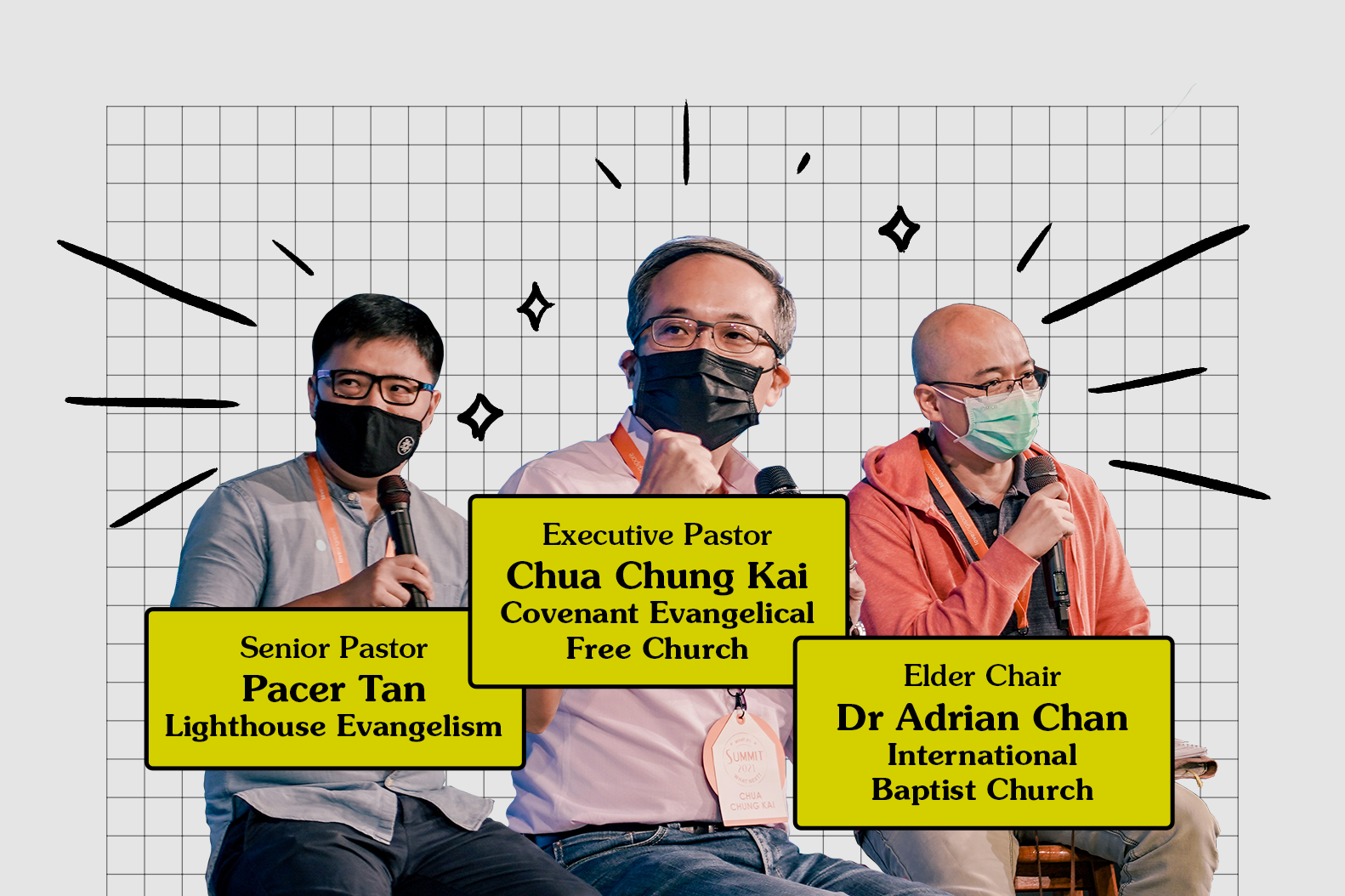
“Everyone is watching the ‘cinema,'” he quipped. “They’re watching the church service on the way to school, on a bus ride. They’re not watching at the time slot that it starts.
“And this is one of the things that I’m talking about – why we miss the old days. Because in the old days, this is the time slot, you have to come.”
“You might say that’s not a bad thing, but I beg to differ,” said Pastor Tan. “I think that’s a really bad thing because that means that the church is not one. The consumerist mindset goes higher when people are watching at 9am, 10am, 11am, at any time they want.
“I’m not saying that if they miss it because of a duty, it’s a bad thing. No, I’m saying that now it’s become intentional. They’re just watching on and off. And when this happens more, you can be sure that the engagement to the house of God, your church, is diminishing.”
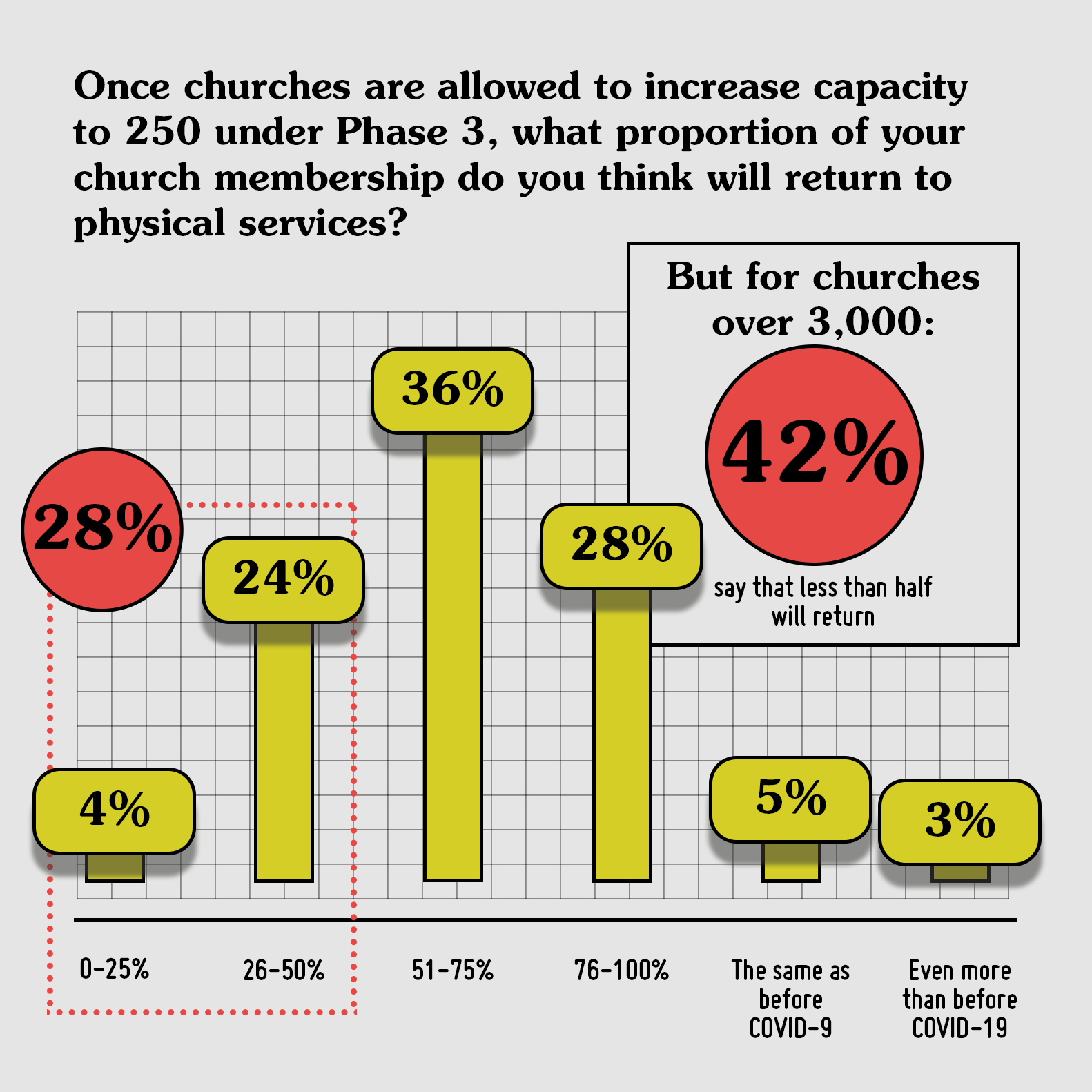
When seen alongside the figures from the LoveSingapore Church Leaders Survey, the overall picture appears to be a bit worrying.
For one, many ministry leaders believed that even when churches are allowed to increase capacity, a big proportion of members will not return to physical services.
Around a quarter (28%) of respondents anticipated that up to half of their church membership will not return. In churches with congregations over 3,000, the percentage of respondents was even higher – 42% said this!
When asked what was the main reason they felt members weren’t coming back yet (they could choose up to 3 answers)…
- 67% pointed to inertia as a key factor.
- 51% cited health and safety concerns.
- 35% believed it was because members were not allowed to sing.
- 33% said people might have felt that online services were good enough.
Of greater concern, perhaps, is the percentage of young ministry leaders (under age 30) worried about inertia (92%).
Does this mean that the vast majority of youth/young adult ministry workers are facing resistance from their congregations when asked to return?
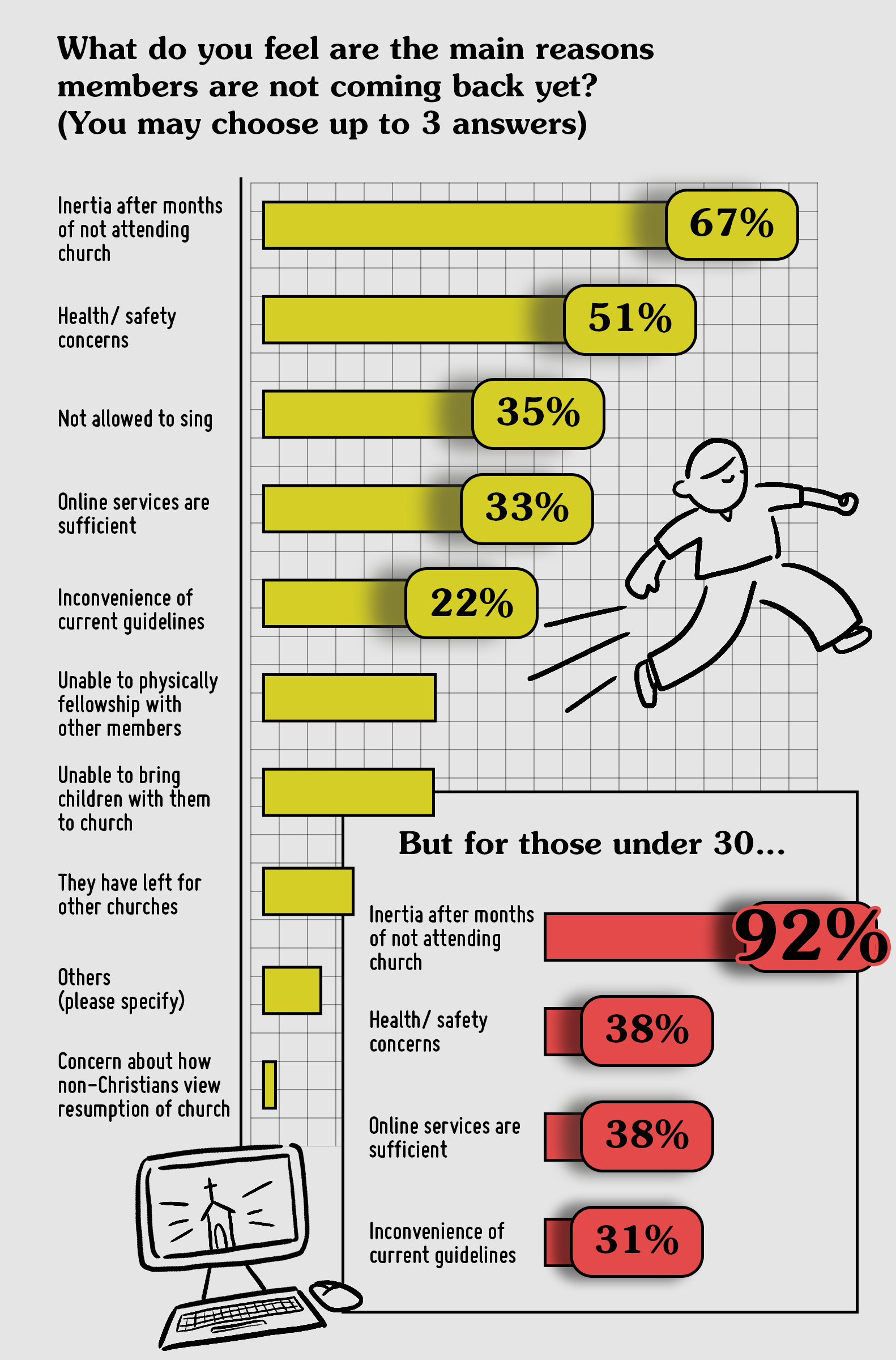
Another statistic from the LoveSingapore Church Leaders Survey seemed to confirm the presence of the inertia apparent in local churches this season: 39% of church leaders felt that their members were somewhat or much less passionate for evangelism.
As Pastor Tan pointed out, engagement and evangelism are closely tied to the health and vitality of the church.
If church members are not coming back and are not sharing the gospel with others, what would this mean for church attendance?
Instead of a focus on big events for evangelism, Pastor Pacer sees that a more personalised approach, which involves activities such as small groups and mentorship, could be a better way forward.
This would require the church to equip its members instead of just relying on a few people to drive the ministry.
“We need to equip our people. But how are we going to equip our members if they are not engaged?” he asked.
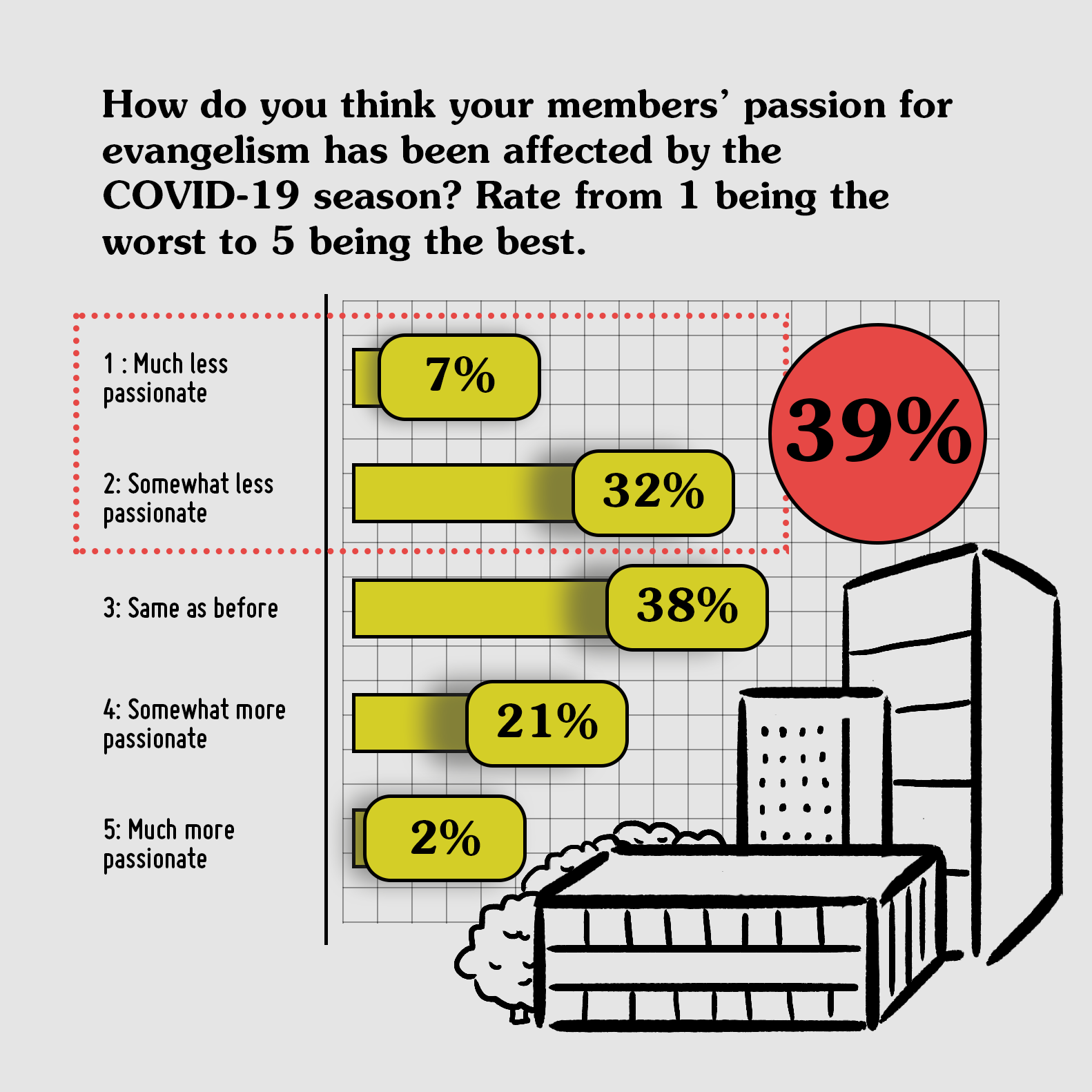
Dr Chan echoed his sentiments, sharing that his church now had to collectively figure out how to do evangelism during this pandemic.
“Usually… it happens within the context of ministries,” he offered. “Ministry is the container by which these activities flow.
“But then we’re figuring out, maybe it’s not about ministry anymore. Because how do we rally people when we have to do safe distancing?
“Maybe we have to move from ministries to movements. Go where the Spirit of God is. Move where the Spirit moves.”
Dr Chan said he foresees struggling a lot with the “unlearning” before we can go up from the “valley” that the church’s evangelism efforts are in right now.
“This valley is not a bad thing,” he encouraged. “But we have to keep learning and keep seeing where it goes.”
Speaking about the need to face these emerging problems, Pastor Chua, too, recognised that leaders had been handed a “health check”, and that it was important to reckon with the state of our churches.
“Whether we believe it or not, we, as a church, are being tested,” he said.
Pastor Chua added that there were three words that helped him to capture what the church was learning this season: pace, gaze and face.
Since everyone had to slow down because of the circuit breaker (pace), we were given a chance to look at ourselves (gaze) and ask fundamental questions such as: What is the church? Is it more than just the worship service?
And finally, the church has been forced to develop new ways of communicating and engaging with people (face) beyond the Sunday platform.
“This valley is not a bad thing, but we have to keep learning and keep seeing where it goes.”
The above conversations are just a snapshot of what’s on the hearts and minds of pastors as they look to lead us into the new normal.
Will people return to church? Are members less engaged to serve? Will there even be a church left to pastor when all this blows over?
For those of us in youth or young adult services, take a second to think about your pastoral team: It’s very likely at least one of them is feeling stretched this season.
HOW IS THE HEALTH OF OUR PASTORS?
The panel concluded with a more personal look into the mental and emotional health of pastors, which was further explored through the results of LoveSingapore Church Leaders Survey.
For instance, when it came to rating their overall emotional state now compared to pre-COVID-19, one in five (19%) said they are now somewhat or much worse, with the majority feeling neutral (39%).
For respondents under 40, 30% said they are much or somewhat worse now. That’s about one in three young pastors or ministry leaders who are feeling worse for wear!
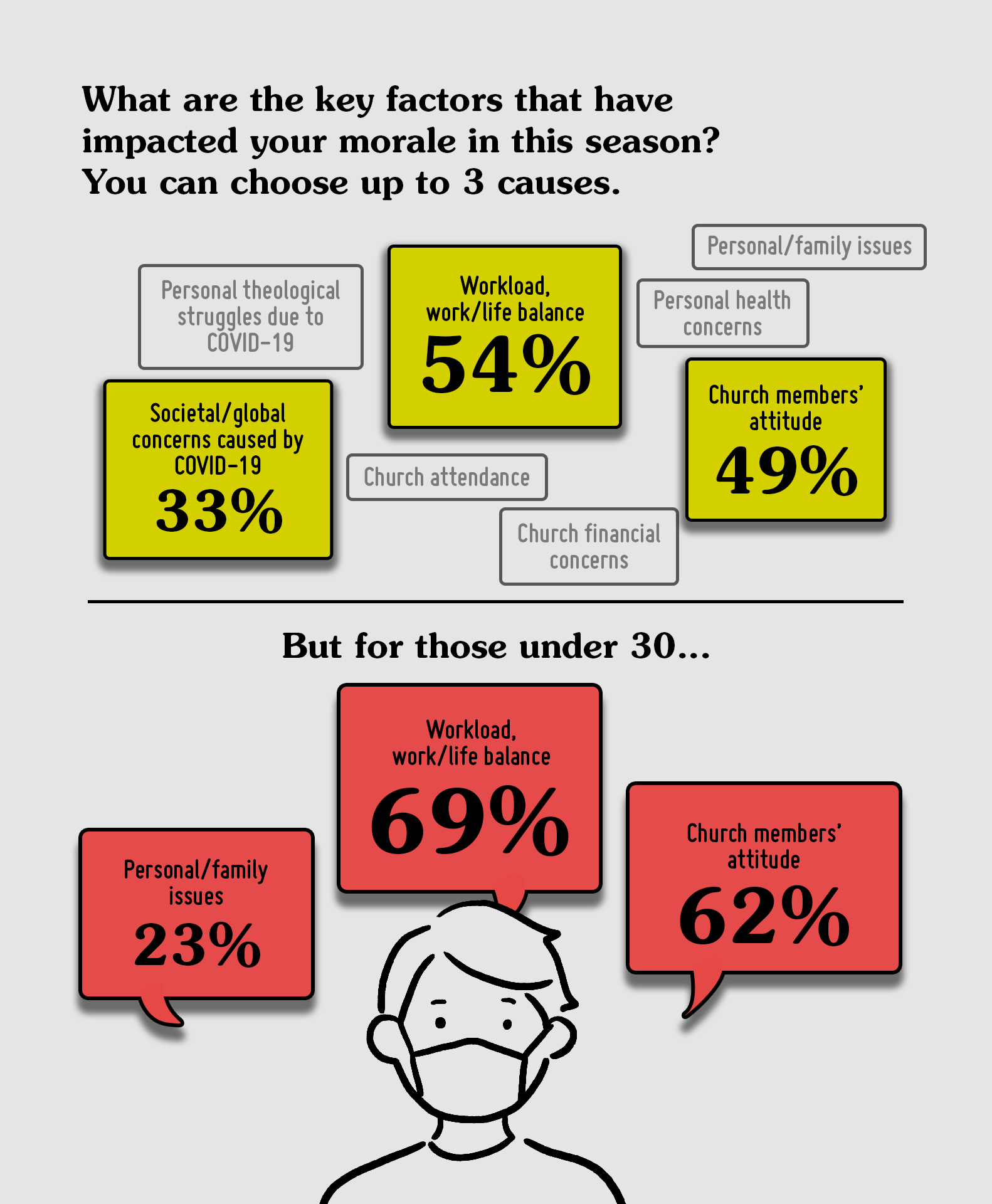
Then, when asked what are the key factors that have impacted their morale in this season (up to 3 choices could be chosen), the answers of those surveyed were concerning.
54% of church leaders said that their workload or work-life balance has negatively impacted their morale, while 49% of respondents cited church members’ attitudes as having negatively impacted their morale.
Additionally, when we consider the higher values from the data set of the younger leaders (under 30), it really tells us they especially are feeling the weight and toll of this season.

The fact is, our youth pastor or ministry leaders may well be demoralised and burnt out. As fellow members of the church, how can we come alongside them and share their burdens?
As a young adult, I’ve come to realise that my pastors are humans just like me. They do their best, enduring many hours of unseen and thankless work just so that the church can function.
I want to honour that — and God – by responding in kind and meeting them halfway so they are not demoralised. I want them to be energised instead by the knowledge that God’s church is thriving amidst the pitfalls of COVID-19!
So if we’re still stuck in inertia, let’s shift gears and engage. And let’s also catch our pastors’ heart for evangelism as we move into the new normal as one church.
By the way, if you personally know a pastor who needs help, a Pastors Mental Health Hub has been formed in collaboration with the Christian Mental Health Advocates and Association of Christian Counsellors (Singapore)!
It seeks to provide a confidential platform for church workers to receive mental health advice and treatment by mental health professionals who themselves are believers guided by Scripture.
To get in touch, write in to pastormh@saltandlight.sg.
FOR MORE STORIES FROM THE PASTORS’ SUMMIT, READ:
- How connected do you feel to God – and the Body of Christ – compared to pre-COVID days?
- Would you say you’re more intentional in your worship of God or less than before? What about sharing the gospel?
- If your church has resumed services, have you started going back yet? Why or why not?
- How can you come alongside your pastoral staff/pastors to share their burdens?









